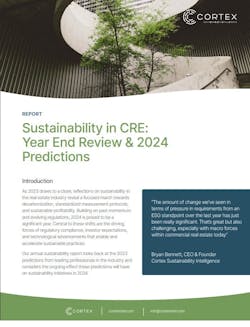Cortex’s Annual Sustainability Report Tells Us What to Expect for CRE in 2024

Cortex Sustainability Intelligence, a cutting-edge platform for decarbonization in commercial real estate, has unveiled its yearly report on Sustainability Trends in CRE. The report focuses on crucial elements influencing sustainability in commercial real estate, particularly within the office asset class. Despite challenges in the office sector in 2023, notable progress was made in decarbonization, setting measurement standards, and striving for sustainable profitability.
Amidst commercial buildings contributing to 28% of total carbon emissions, decarbonization strategies have gained heightened significance for CRE leaders, grappling with mounting pressures from investors and regulatory bodies. Cortex's report delves into three predictions for the upcoming year, drawn from an analysis of 2023 events and previous forecasts. Engaging with leaders in the commercial real estate sector, Cortex's team of engineers, data scientists, and sustainable CRE experts discerned three pivotal themes shaping ESG strategies in the coming year. The findings include:
- Pressure to Decarbonize will Intensify in 2024, Driven by New Entities: Aligned with last year's predictions, the urgency to decarbonize has not only persisted but intensified. Investor pressure, regulatory actions, and tenant demands have emerged as powerful catalysts, propelling sustainability from the periphery to a central business strategy. Tenants play an increasingly influential role in the push for decarbonization, expressing a willingness to pay premiums for sustainable spaces. The evolving landscape, however, faces challenges like the "split incentive" problem. Innovative strategies like green leases and data-sharing agreements are fostering the needed collaboration between tenants and owners, marking a pivotal shift in the industry.
- Ongoing Challenges Persist in Decarbonization Measurement and Reporting: Despite attempts to standardize metrics, difficulties persist in assessing and communicating progress in decarbonization. While the Global ESG Benchmark for Real Assets (GRESB) has become more widely recognized, there is still a lack of uniform terminology and standardized methodologies. Global endeavors like the Corporate Sustainability Reporting Directive (CSRD) and the anticipated SEC climate disclosure regulations emphasize the necessity for high-quality data suitable for investors. Between voluntary disclosures and soon-to-be enforced disclosures, the ability to aggregate data at scale for reporting transparency and auditability will be critical.
- Achieving Decarbonization alongside Economic Gain is a Priority in the Year Ahead: Despite navigating a period of capital scarcity, the focus on profitable decarbonization remains paramount. Operational improvements, such as digitizing building systems and adopting renewables, offer practical approaches to reduce carbon emissions and energy costs. Research indicates that these initiatives can cut operational carbon emissions by up to 42%, addressing concerns about capital expenses. Applying intelligence to Building Management Systems (BMS) will not only enhance sustainability but also improve asset value in the year ahead. As the industry grapples with financial challenges, software-driven optimization options will offer a rapid start to decarbonization goals and an ESG payback.
"Considering the ESG landscape, the past year has witnessed a noteworthy surge in pressure and requirements, signifying a positive shift. However, aligning with budget constraints in 2023 adds a layer of complexity. As we confront the impending challenges within commercial real estate, the macro forces at play underscore the critical need for strategic decision-making," said Bryan Bennett, CEO and Founder of Cortex Sustainability Intelligence. "It's not just about embracing ESG; it's about finding a balance that ensures sustainability without compromising financial prudence in the face of what promises to be a challenging year.”
Leveraging Cortex's decarbonization platform, CRE industry leaders have gained valuable insights at both asset and portfolio levels, expediting their decarbonization efforts. Cortex's expertise, evident in reducing 23,000 metric tons of CO2e annually across the 45 million square feet it manages, aligns with the diverse needs of asset managers, property managers, building engineers, and sustainability executives in achieving ESG objectives. As the CRE sector ventures into 2024, effective decarbonization demands collaborative endeavors from investors, regulators, tenants, and owners. Sustainability is no longer a choice but an essential strategic imperative.

